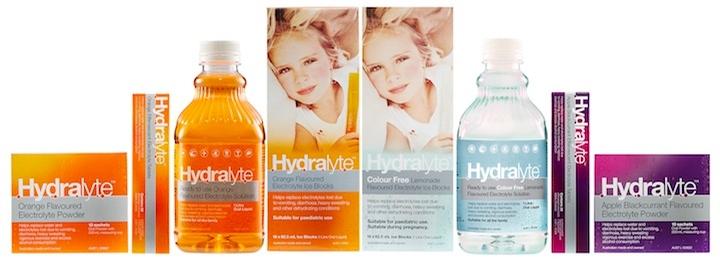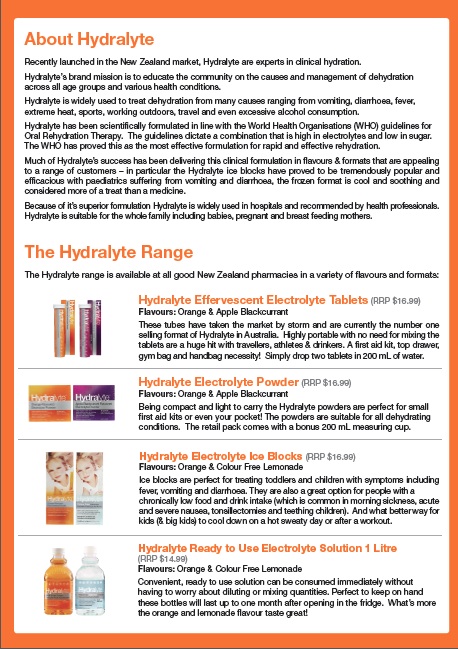
Long, hot summer prompts warning about dehydration
4 March 2015, 10:37PM
Alexander Communications
Sun, sand, sea and active weekends are key ingredients for a good Kiwi summer – but they are also ingredients for dehydration.
Families are enjoying one of New Zealand’s hottest summers in 50 years, but it’s a timely reminder to ensure children and adults look after their health and stay hydrated, especially as St John staff are reporting an increasing incident rate of dehydration and heat stroke nationwide.
Our bodies are made up of a significant amount of water: 70% in infants, 60% in men, 55% in women and 45% in people 65 and older. But it’s not just water that’s important for your body to function properly, replacing lost electrolytes is just as crucial.
Every day our body loses fluid and electrolytes via urine, sweat, saliva, and other bodily fluids. Usually, a regular, healthy diet will serve to replace lost electrolytes and fluid. However, certain conditions – extreme heat, vomiting and diarrhoea, fever and nausea, excessive alcohol consumption, heavy sweating, or lack of food and fluid intake – can lead to inadequate levels of fluid and electrolytes within our bodies and quickly cause dehydration. We only have to lose as little as 2% of our body weight before the signs of dehydration become apparent.
Whether you’re a busy parent wrangling children, training for an endurance event, or a dedicated fitness and gym enthusiast, attention to hydration is important. However, we often overlook its importance and then wonder why we are over-tired, still thirsty after a glass of water and prone to headaches.
Hydralyte, a clinical electrolyte/hydration product range which recently arrived on New Zealand shores, has set its sights on educating Kiwi parents, consumers, sportspeople, and healthcare professionals on the causes and symptoms of dehydration, and on arming Kiwis with an accessible remedy to help manage it.
Clinical education pharmacist at Hydralyte Sarah Gray holds postgraduate certificates in pharmacy practice and human nutrition, and stresses that ‘knowledge is power’ when it comes to dehydration, its causes and treatment. “It’s important to learn to recognise the signs and symptoms of dehydration in yourself and your family and to be constantly aware of your hydration status. Common conditions among people of all ages, such as vomiting and diarrhoea, heavy sweating and lack of food and fluid intake, can dehydrate us quickly.”
Ms Gray also points out that in many cases being prepared can mean the difference between treating a sick child at home or a trip to hospital. “It’s really important to always have clinical electrolyte products on hand – kids with gastrointestinal upsets don’t give you a lot of warning about when they are going to be sick. Having products like Hydralyte in your freezer, fridge or first-aid kit will make a great deal of difference when the pharmacy is shut at 10pm and you have a sick child.”
And when it comes to New Zealand’s record temperatures and propensity for high-intensity outdoor activities, Ms Gray recommends that during hot weather and exercise the aim is not to wait until you’re dehydrated and treat it but, where possible, minimise the risk of dehydration by monitoring your hydration status and replacing fluid and electrolytes routinely.
With an extensive product range to fight dehydration, Hydralyte appeals to all regardless of age or sporting prowess. From Hydralyte electrolyte ice blocks perfect for toddlers and children with vomiting and diarrhoea symptoms, to Hydralyte effervescent tablets that are highly portable for the Kiwi athlete and travellers, there is a product ideal for every Kiwi and situation.
The range is now available in a variety of flavours and formats at leading pharmacies New Zealand-wide.
Common symptoms of dehydration include:
• Sticky or dry mouth;
• Increased thirst;
• Fatigue;
• Dizziness;
• Headache;
• Dark yellow or decreased urine output (you can check babies’ nappies for this);
• Muscle cramps;
• Lack of concentration;
• Degraded mood (cranky and irritable).
www.hydralyte.co.nz @Hydralyte #hydratewithHydralyte

